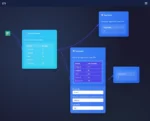Blockchain technology is rapidly gaining popularity across various industries, from finance and healthcare to logistics and supply chain management. This technology is a secure, decentralized ledger that can record and verify transactions, providing a transparent and tamper-proof way to store and share data. In this article, we will explore what blockchain is, how it works, and its potential impact on the data industry.
What is Blockchain?
At its core, blockchain is a distributed ledger that can record transactions between two parties in a secure and verifiable way. The technology was originally developed for the cryptocurrency Bitcoin but has since been adapted to many other use cases. Rather than having a central authority such as a bank or government, blockchain uses a network of computers to store and verify transactions, making it resistant to tampering and fraud.
How does Blockchain work?
In a blockchain system, transactions are grouped together into blocks, which are then added to a chain of previous blocks, creating a chronological ledger of all transactions. Each block is verified by multiple computers in the network, making it virtually impossible to alter or delete data once it has been added to the blockchain. This decentralized and secure nature of the blockchain makes it an ideal technology for managing sensitive data, such as financial transactions or healthcare records.
Potential Impact of Blockchain on the Data Industry
The potential impact of blockchain on the data industry is significant. With its ability to store and manage data securely, blockchain has the potential to transform the way we store and share data. One of the most significant benefits of blockchain is its ability to create a tamper-proof audit trail of all transactions. This makes it easier for businesses to track and verify the authenticity of data, reducing the risk of fraud and errors.
Another advantage of blockchain is that it can create a more transparent and secure data exchange process. This technology allows for peer-to-peer transactions without the need for intermediaries, reducing costs and increasing efficiency. This could potentially revolutionize data sharing across industries, enabling secure and trusted data exchange between parties.
In conclusion, blockchain is an emerging technology that has the potential to transform the data industry. Its decentralized, tamper-proof nature makes it an ideal technology for managing sensitive data, such as financial transactions and healthcare records. As blockchain technology continues to evolve and improve, we can expect to see even more widespread adoption of this technology in the years to come.

























